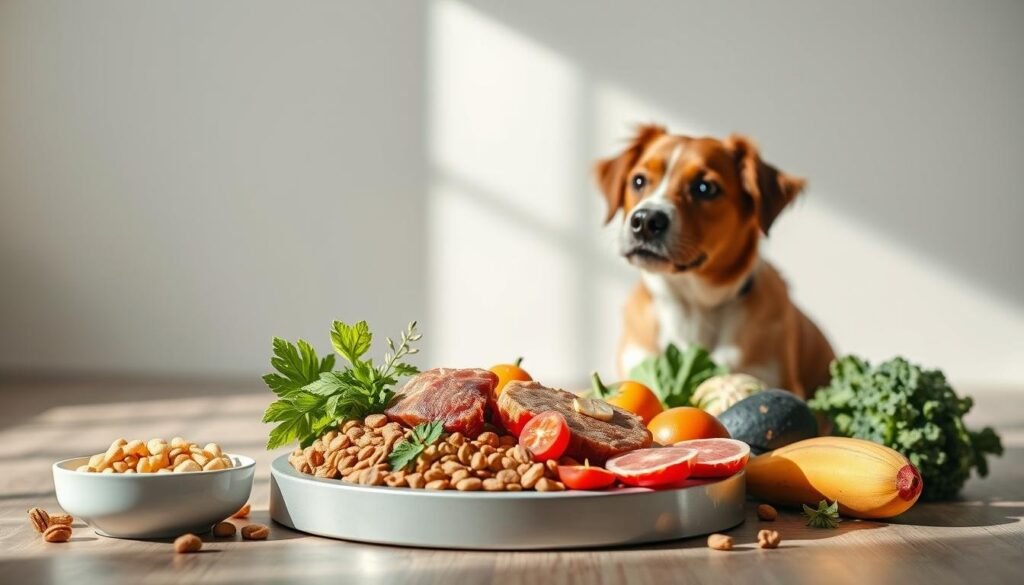As a dog owner, you’re likely concerned about what you feed your pet. With the rise of grain-free alternatives in dog diets, coconut flour has gained popularity. But what impact does it have on your dog’s health?
Understanding the effects of coconut flour on dog digestion is crucial for making informed decisions about your pet’s nutrition. Canine nutrition is a complex field, and introducing new ingredients like coconut flour requires careful consideration.
You’re probably wondering whether coconut flour is a suitable addition to your dog’s diet. This article aims to explore the safety and potential benefits of using coconut flour in your dog’s meals, helping you make the best choices for your pet’s well-being.
Contents
- 1 What Is Coconut Flour?
- 2 Nutritional Profile of Coconut Flour
- 3 Is Coconut Flour Safe for Dogs’ Digestion?
- 4 Potential Benefits of Coconut Flour for Dogs
- 5 Potential Risks and Considerations
- 6 How to Introduce Coconut Flour to Your Dog’s Diet
- 7 Coconut Flour and Canine Digestion: A Summary
- 8 FAQ
- 8.1 What is coconut flour, and how is it made?
- 8.2 Is coconut flour safe for my dog to eat?
- 8.3 What are the potential benefits of coconut flour for my dog?
- 8.4 Can coconut flour cause digestive issues in dogs?
- 8.5 How do I introduce coconut flour to my dog’s diet?
- 8.6 Are there any medical conditions that may contraindicate the use of coconut flour in dogs?
- 8.7 Can I use coconut flour as a replacement for traditional flours in my dog’s diet?
- 8.8 How should I store coconut flour to maintain its quality?
What Is Coconut Flour?
Coconut flour comes from the leftover of coconut milk production. It’s made by drying and grinding this by-product. It’s a favorite in gluten-free baking because it’s full of fiber and protein.
Coconut flour is created from dried coconut meat, ground into a fine powder. It’s very absorbent and works well in recipes needing lots of liquid. Unlike regular wheat flour, coconut flour is gluten-free. This makes it great for people with gluten issues.
Coconut flour is not just gluten-free. It’s also packed with fiber, protein, and good fats. This makes it a hit in healthy baking. But, remember, it soaks up more liquid than regular flour. So, you might need to add more liquid to your recipes.
Knowing how coconut flour works and what it’s made of is key. This is especially true when thinking about adding it to your dog’s food. We’ll dive deeper into this in the next sections.
Nutritional Profile of Coconut Flour
It’s important to know what’s in coconut flour for dogs. It’s packed with nutrients, making it great for many recipes.
Fiber Content
Coconut flour has a lot of fiber, about 60% by weight. This helps with digestion, keeping things regular and supporting good gut health.
Protein and Fat Composition
It also has a good amount of protein and fat. The protein helps with your dog’s muscle health. The fat gives them energy.
| Nutrient | Amount per 100g |
|---|---|
| Fiber | 60g |
| Protein | 20g |
| Fat | 10g |
Vitamins and Minerals
Coconut flour is also full of vitamins and minerals. It has iron and potassium. These help keep your dog healthy, supporting blood cells and muscles.
The nutritional profile of coconut flour shows its benefits and what to consider for dogs. It’s a good source of fiber and protein, making it a healthy choice for dog food.
Is Coconut Flour Safe for Dogs’ Digestion?
When we talk about coconut flour and dogs, we need to look at its nutrients and how dogs digest it. Coconut flour is packed with fiber, which can be hard for dogs to break down.
The fiber in coconut flour might upset a dog’s stomach if not added slowly. But, some dogs might handle it fine, especially if you introduce it little by little.
Digestive Enzymes and Coconut Flour
Dogs have different digestive enzymes than humans. This means they process coconut flour differently. While dogs can handle some fiber, too much can cause stomach problems.
Fiber Processing in Canine Digestion
The fiber in coconut flour is mostly the kind that helps with bowel movements in dogs. But, it’s important to watch how your dog reacts to it. This is to prevent any bad effects on their dog digestion.
To keep your dog safe, start with a small amount of coconut flour. Then, slowly add more. This lets their body get used to it. Always talk to a vet before changing your dog’s diet a lot.
Potential Benefits of Coconut Flour for Dogs
Coconut flour has many benefits for dogs, especially those on grain-free diets. As a dog owner, finding the right ingredients is key to your pet’s health.
Coconut flour is great for making dog treats and meals. It’s high in fiber, which helps with digestion.
For dogs needing a grain-free diet, coconut flour is a good choice. It can replace grains in recipes, offering a gluten-free option. This helps manage grain sensitivities.
Benefits for Dogs with Food Sensitivities
Dogs with food sensitivities can also benefit from coconut flour. It’s hypoallergenic, making it safe for dogs with certain dietary needs. This can lower the chance of bad reactions to common grains.
When adding coconut flour to your dog’s diet, start slowly. Watch for any signs of upset stomach or other issues. Always talk to a vet before big diet changes.
Potential Risks and Considerations
Adding coconut flour to your dog’s meals can be a good idea. But, it’s important to know the potential risks. This ensures it’s safe for your pet.
Coconut flour has a lot of fiber, which is good for digestion. But, it can upset your dog’s stomach if added too fast or in too much. Monitoring your dog’s response and adding it slowly can help avoid this problem.
Medical Conditions That May Contraindicate Use
Dogs with some health issues should not have coconut flour. This includes those with stomach problems or allergies to coconut. It’s key to check for any health problems before adding coconut flour to their diet.
| Medical Condition | Potential Risk with Coconut Flour |
|---|---|
| Gastrointestinal Disease | Exacerbation of symptoms due to high fiber content |
| Coconut Allergy | Allergic reactions ranging from skin irritation to anaphylaxis |
Consulting with Your Veterinarian
Always talk to your vet before changing your dog’s diet. This is especially true for new foods like coconut flour. They can give advice tailored to your dog’s health and needs.
Knowing the risks and how to avoid them lets you safely add coconut flour to your dog’s diet. This can improve their nutrition and health.
How to Introduce Coconut Flour to Your Dog’s Diet
When adding coconut flour to your dog’s food, start small to avoid upset stomachs. Mix a little coconut flour with their usual food. Then, slowly add more over time.
Keep an eye on how your dog reacts to coconut flour. Look for signs like diarrhea or vomiting. If you see these, cut back or stop using it.

Here’s a simple recipe to begin: Mix 1 cup coconut flour, 1/2 cup peanut butter, and 1 egg. Roll it out, cut into shapes, and bake at 350°F for 15-20 minutes.
Grain-Free Peanut Butter Treats
For treats, mix 1 cup coconut flour, 1/2 cup peanut butter, and 1/4 cup honey. Shape into balls and chill until firm. These treats are tasty and safe for dogs with grain allergies.
By adding coconut flour slowly and using it in homemade treats, you can enrich your dog’s diet. It’s nutritious and easy on their stomach.
Coconut Flour and Canine Digestion: A Summary
As a dog owner, knowing how coconut flour affects your pet’s digestion is key. Coconut flour can be good for your dog’s diet, helping with digestion and reducing inflammation. But, it’s important to add it slowly and watch how your dog reacts.
Coconut flour is full of fiber, which is good for your dog’s stomach. But eating too much can upset their stomach. Start with small amounts to avoid any problems.
In short, coconut flour can be a great addition to your dog’s food if used right. Always talk to your vet before changing your dog’s diet. This way, you can make sure your dog gets the benefits without the risks, keeping their digestion healthy.
FAQ
What is coconut flour, and how is it made?
Coconut flour comes from coconut milk production. It’s made from dried and ground coconut meat. It’s high in fiber and protein, great for gluten-free baking.
Is coconut flour safe for my dog to eat?
Coconut flour is safe for dogs in small amounts. But, introduce it slowly to avoid stomach problems.
What are the potential benefits of coconut flour for my dog?
Coconut flour is good for dogs who can’t eat grains or have food allergies. It’s great for homemade treats and can meet special dietary needs.
Can coconut flour cause digestive issues in dogs?
Yes, coconut flour’s high fiber can upset a dog’s stomach. But, some dogs might do okay with it, especially if introduced slowly.
How do I introduce coconut flour to my dog’s diet?
Start with small amounts of coconut flour and watch for any bad reactions. Try recipes like coconut flour dog biscuits or grain-free peanut butter treats.
Are there any medical conditions that may contraindicate the use of coconut flour in dogs?
Dogs with certain health issues, like stomach problems, might not be able to eat coconut flour. Always talk to your vet before changing your dog’s diet.
Can I use coconut flour as a replacement for traditional flours in my dog’s diet?
Coconut flour can be a grain-free option. But, know its nutritional value and how it affects digestion before making big changes.
How should I store coconut flour to maintain its quality?
Keep coconut flour in an airtight container in a cool, dry spot. Stay away from sunlight and moisture.

Derrick Wilcox is a certified canine behaviorist with over 12 years of experience at Happy Paws Animal Clinic and Pawsitive Training Center, helping pet owners ensure safer, healthier, and happier lives for their dogs.



